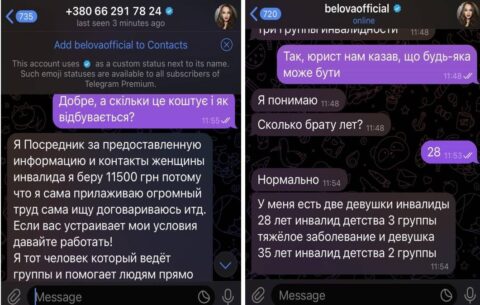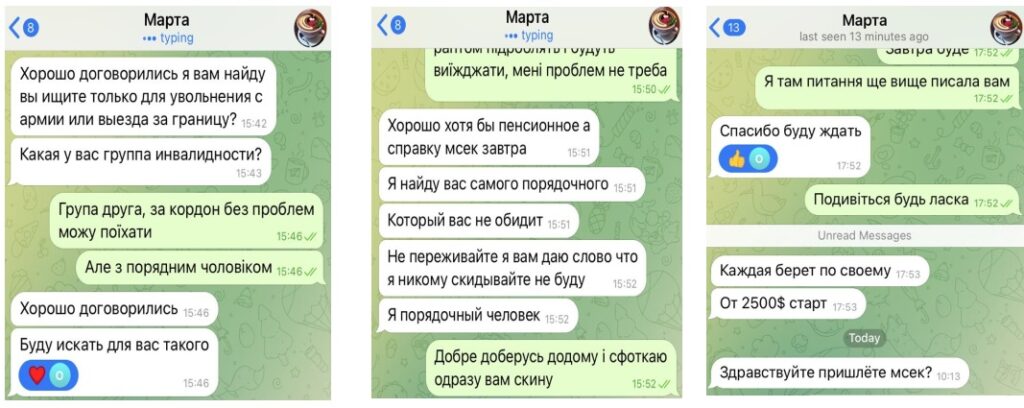Over the past two years, NGL.media has repeatedly described various legal and criminal schemes used by Ukrainians to avoid mobilization: enrolling into universities, using Shliakh system, fake divorces and child custody etc. This time, we were interested in a less popular but no less effective option used by men subject to military service: fake marriages with women with disabilities to receive a deferral and cross the border.
The main difficulty in such cases is that fake marriages are not treated as against the law in Ukraine, so this scheme is completely legal. Nevertheless, the police and the Security Service of Ukraine sometimes manage to detain people who make money from organizing such marriages.
We decided to analyze the situation and found participants in this scheme who earn $1,500-5,000 for organizing marriages. Of course, there are no guarantees. We also talked to lawyers and law enforcement officers and even tried to marry off our journalist. And this is what happened.
How does it work?
There are many groups on Facebook and Telegram that offer fake marriage opportunities. Most of them are called just that: “Fake Marriage”, “Fake Marriage Odesa”, “Dating Kyiv”, etc. They regularly post ads looking for women with disabilities or vice versa – looking for men who want to go abroad through marriage.
NGL.media published several ads in such groups from fake accounts – one on behalf of a man (“Ivan”) looking for a woman with a disability to leave Ukraine and two on behalf of women – a sister of a man subject to military service (“Kateryna”) and a girl with a disability (“Liudmyla”) – to take a close look into this scheme.
Within a few days, dozens of women with disabilities responded to Ivan’s ad, ready, they said, to marry him for two or three thousand dollars and cross the border together.
It got more interesting when we started receiving messages from intermediaries – “matchmakers” who are looking for women with disabilities and able-bodied men to marry them and make money from it.
A transgender woman as she identifies herself calling herself Margarita Belova turned out to be an administrator of one of these “marriage” chats. She communicates with potential clients from her real Telegram account, emphasizing that this way she guarantees her integrity and the quality of her services.
“How can I disappear if I have a real profile with my photos and my data? Scammers don’t put themselves on display. Scammers write from fake pages, where they put pictures, but not their real photos. But I am the owner of the group [telegram channel]. So, it’s up to you – if you don’t want to believe it, don’t,” Margarita Belova responded to the doubts of “Kateryna,” the sister of a potential conscript who would like to dodge mobilization through a fake marriage.

Screenshots of correspondence between Belova and the NGL.media journalist who introduced herself as the sister of a man subject to military service
Margarita Belova offered “Kateryna” two suitable women with disabilities, a 28-year-old and a 33-year-old, for her brother to marry. Belova asked to transfer UAH 11,500 to her card for her services, which only consisted in providing contacts of these women. We were supposed to pay the main amount – 3000 euros – to the chosen woman after the marriage was registered and they crossed the border together. Obviously, the money was never transferred, and we passed all the information about Margarita to law enforcement.
From another fake account under the name “Liudmyla”, the NGL.media journalist for a period corresponded with another mediator in fake marriages, who called herself “Marta”. “Liudmyla” introduced herself to “Marta” as a woman with a disability who wanted to enter into a sham marriage and would like to find a “decent man.”
To make the legend more believable, we sent ‘Marta’ a photo of a disabled person’s ID card downloaded from the Internet and an AI-generated photo of ‘Liudmyla’. Marta didn’t do any verification of this data and very quickly found us a client – a Lviv resident who was ready to pay $3,000 immediately after marrying “Liudmyla.” She even sent us his photo – for some reason, together with his real wife. At this stage, we refused to work with “Marta”, after which she tried to erase the correspondence.

Screenshots of correspondence between the NGL.media journalist and the organizer of fake marriages, who called herself Marta
NGL.media decided to find out who owned the phone number that Marta used to communicate on Telegram, and it turned out to be another number of the aforementioned Margarita Belova. Belova posted the same number on Instagram, but at the time of this article’s publication, she had already deleted it from her account and closed the page.
Judging from Margarita Belova’s available social media accounts, she participated in the TV talk show “Ukraine Speaks” and other similar programs. At the same time, the woman either changed her surname several times or used pseudonyms, because she used to appear on the show as Margarita Kovaleva, and before that, as Victoria Beilit. Before the sex change, the woman’s name was Vitalii – at least, that’s what her mother claimed in one of the TV shows.
It’s likely that Margarita Belova has occasional financial difficulties, because back in 2022 she asked her Instagram followers to send her money to return to Ukraine from abroad. And not so long ago, she was earning money by reading tarot cards.
Before this article was published, NGL.media contacted Belova for a comment. At first, she denied that she was organizing fake marriages, but later admitted it.
“Well, I wouldn’t say that I’m doing it that much. I am contacted by women with disabilities and men, and I help them, just pass on contacts, bring them together. Of course, I do it for money. I’m not going to do it for free… I introduce them, and then they make arrangements with each other, get married. That’s where my involvement stops,” said Margarita Belova.
“100% guarantee”
On behalf of “Ivan,” we spoke to several other intermediaries like Belova and found out that the price of a fake marriage hovers between 2000 and 7000 euros. “Matchmakers” work anonymously, using nicknames and rarely disclosing their own phone numbers. Clients are convinced that it is more profitable to negotiate through intermediaries, believing they will help with paperwork and organize a quick marriage registration. For example, one of these intermediaries, Maryna, offered to solemnize a marriage within a few hours after the first phone conversation – without waiting in line at the registry office or even without the husband’s presence.
For such a quick all-inclusive marriage, we had to pay UAH 5,000 in advance (to settle everything at the registry office) and 2,000 euros to the “wife” after crossing the border.
NGL.media received two bank card details from Maryna: her personal card in the name of Maryna K. and the card of a girl with a disability, S. L. Lemeshko.
Often, similar ads on Telegram are posted by commonplace scammers who promise exemption from mobilization, a quick marriage, border crossing, and any other services in demand. Once they receive the deposit, they simply disappear, and their victims can only be quietly indignant, because in such cases, you are unlikely to go to the police for obvious reasons.
For example, our “Ivan” became interested in one of these fake marriage ads and started talking to a woman who called herself Yaroslava. Already during the voice call, she started offering “Ivan” alternative options rather than the marriage, calling them more effective, with a “100% guarantee” of the deferral. The idea behind the first scheme was that Ivan had to come to Berdychiv, go to a local hospital for two months, and during this time he would get an official disability status. When Ivan refused to pay a deposit for this, Yaroslava suggested an even more exotic option – to go to Moldova illegally through the Chernivtsi region. By the way, Yaroslava talked to us from a Moldovan phone number.
“There is a green gate, which means that you do not go through the checkpoint, so you cross illegally. No one will tack you there, there is an agreement with the border guards. There is full support, you pay the attendants and travel with them… 100% guarantee. We have worked like this many times before…” Yaroslava was very convincing, but “Ivan” still did not want to pay in advance. That was the end of our conversation.
Everything is absolutely legal
According to Ukrainian legislation According to Article 23 of the Law “On Mobilization Preparation and Mobilization” and Article 18 of the Law “On Military Duty and Military Service”, the following categories of persons subject to military service may receive a deferral, among others: women and men who have a dependent adult child who is a person with disability of group I or II; who have a spouse with disability and/or one of their parents or the parents of their spouse with disability of group I or II, provided that such persons with disabilities have no other able-bodied persons obliged by law to support them; guardians of a person with disability who has been declared incapacitated by a court; persons engaged in permanent care for a person with disability of group I; persons engaged in permanent care for a person with disability of group II or for a person who, according to the conclusion of a medical and social expert commission or a medical advisory commission of a health care institution, needs permanent care, in the absence of other persons who can provide such care, having a close relative with disability is a legal way to be discharged from military service or to receive a deferral from mobilization. It’s also a legitimate reason for leaving the country.
According to lawyers NGL.media consulted, military personnel are now most often discharged from service precisely because they have a close relative with disability. It is also not uncommon for men of military age to travel abroad as caretaker for a person with disability.
 Fictitious divorces
Fictitious divorces“In my experience, out of 100 cases of servicemen who apply for discharge for family reasons, 95 cases use that topic, i.e., if their wife, their parents or their wife’s parents have disability. To get exemption, it is enough to have such a marriage,” explains lawyer Yevhen Filipets.
According to the Ministry of Social Policy, there are more than 3 million people with disabilities in Ukraine, and women are not singled out as a separate category. And theoretically, the family members of each of them who are subject to military service have the legal right to receive a deferment and, if they wish, to go abroad. That’s exactly where the abuses we have described originate: For a few thousand dollars, men of military age are offered a blind marriage with a woman with disability in order to either get out of the service or go abroad. Often, they are offered a two-for-one deal.
“I only gave the girl’s contacts”
Sometimes the organizers of such schemes are detained anyway. For example, back in September 2022, two women were in Zhytomyr for receiving money from a conscript for organizing a fictitious marriage with a 21-year-old girl with a disability, Marta O. detained in Zhytomyr for receiving money from a potential serviceman for organizing a fake marriage with a 21-year-old girl with a disability, Marta O. It cost him 1,500 euros – since then, prices in this “market” have increased significantly.
Women with disabilities, according to the investigation, were sought among members of the Zhytomyr City Association of Disabled People. Deputy director of this NGO, Olha Khomenko, is one of the three suspects in this story.
Khomenko is currently pleading not guilty.
“My friend contacted me because she knew I worked with people with disabilities. She asked me how a man could go abroad legally. I told her that the marriage was the only option and gave her the girl’s [Marta O.] contact details. I had no further involvement and didn’t know that there was any money at all,” she told NGL.media.
Marta O. has already received her sentence Marta O. was sentenced to five years in prison under part. 3 of Art. 332 of the Criminal Code (Illegal transportation of persons across the state border), but on the basis of Art. 75 of the Criminal Code, her sentence was replaced with probation – two years of probation, which means she will remain free if she does not get caught for another crime during this time. The girl refused to talk to NGL.media about the details of the case. Olha Khomenko has not yet been sentenced, and the third suspect, an intermediary in the organization of the marriage, has been put on the international wanted list, the Zhytomyr regional prosecutor’s office told NGL.media.
This story ended negatively for the participants in the scheme because they were exposed. However, for the male client, the detention had no consequences at all, as he could not even be accused of bribery, because he did not pay money to officials.
“The Ukrainian people are very resourceful”
There are dozens of court rulings in the register of court decisions that relate to marriages of women with disabilities in order to leave Ukraine. In some cases, there are even court sentences, like Marta O.’s from Zhytomyr. These are not particularly convincing figures, as it is difficult to identify such cases and bring them to actual punishment.
It is important to emphasize here that Ukrainian law does not provide for punishment specifically for concluding a fake marriage. The very concept of a fictitious marriage, although defined by the Family Code, is quite difficult to prove – it requires a court decision.
“In fact, it is almost impossible to prove the marriage fake; it is possible only through court decision. And one of the spouses has the right to go to court to recognize such a marriage as fake. Will he or she apply in these circumstances? I don’t think so. That’s why there is such a conflict. Ukrainian people are very resourceful,” says lawyer Yevhen Filipets.

So, in these situations, the police open criminal proceedings under the article on illegal transportation of persons across the state border Article 332 of the Criminal Code of Ukraine. To do this, the investigation still needs to prove that crossing the border was the ultimate goal in each of these stories, which is very difficult.
In the Zhytomyr case, the defendants were detained after the marriage, when they received money from the client, but before they tried to cross the border. Apparently, the police provided evidence to the court that the money was paid for organizing the border crossing. They probably conducted an investigative experiment and participated in the scheme to expose it.
There are cases when such fictitious “newlyweds” are detained directly when they try to travel to a neighboring country. Ukrainian border guards sometimes publicly report similar detentions. Somehow, they manage to get the couple to admit that their marriage was registered only for the purpose of crossing the border. The border guards are not sharing what questions they asked such “newlyweds” at the border.
“Why should border guards disclose the details? So that the actors who intended to use such a scheme could learn how we detect it? Such attempts to illegally cross the border are detected either by our operations staff, who have information in advance, or directly at the border, when our inspectors see the person, check the documents and find out all the circumstances,” Andrii Demchenko, spokesman for the State Border Guard Service, told NGL.media.
According to him, compared to attempts to cross the border with forged documents (certificates of disability from the Medical Service of Ukraine, documents from the Military Recruitment and Social Services Center on removal from military registration, etc.), the scheme of marrying a woman with a disability is not as common, but cases are recorded from time to time.
In fact, it can be assumed that the fake marriages detected by border guards are only a small percentage of those that were actually concluded. After all, the concept of fake marriage, as already mentioned, is virtually impossible to prove until a person admits to it. So, legally speaking, such arranged marriages are a conditionally legal scheme for obtaining a deferral and leaving Ukraine.
 Investigation
Investigation“In my practice in the military, I saw documents of guys born in 2001 who had wives born in 1949. And it’s a legal marriage. On the one hand, it looks ridiculous, but on the other hand, it’s very sad, because people do all sorts of things to get out of the service, although it’s not a correct and proper practice. But such documents do exist, and they are being submitted, and they are completely legal,” says lawyer Yevhen Filipets.
In November 2023, two women were detained in Odesa for a similar scheme: One of them was the organizer of fake marriages, and the other had a disability and agreed to become the wife of a man of military age for a short time so that he could go abroad. The women were detained while receiving money before crossing the border. But the police say that the scheme organizer, 34, managed to take other men across the border using fake marriages. One marriage like that cost a man $4,500.
What will the new law on mobilization change?
The new draft law amending the Law of Ukraine “On Mobilization Preparation and Mobilization,” which is about to be considered in the second reading, proposes to abolish the disability of a family member as a ground for deferral.
This draft law is presently being prepared for consideration and is being amended, so it is not clear what opportunities it will open/close and what consequences it will have.
“There is another possibility that has not been canceled in the new draft law. If a person really needs care, then care can be established on a non-professional basis It is assigned to a person who provides social care services to a family member on a non-professional basis, without undergoing special training. It applies to family members who are persons with disabilities of group I; children with disabilities; elderly citizens with cognitive impairments; terminally ill persons who, due to impaired body functions, cannot move or take care of themselves; children who have not been diagnosed with a disability but who are suffering from serious illnesses for them. However, this possibility applies to a limited number of people: People with official disability status of the first group, partially of the second group, and several other categories. And it is important that the caregiver has no official income. Therefore, I foresee that people will be knocking on social services’ door, because everyone will be willing to officially register as caretaker for their relatives. And to do this, people will slash their official income and switch to cash jobs,” predicts Yevhen Filipets.
Daria Tarasenko, a lawyer who specializes in mobilization legislation, believes that even if MPs pass the new bill, the possibility to cross the border with relatives with disabilities will still remain available for some time.
“Since the rules for crossing the border are not spelled out in the law, but in a resolution of the Cabinet of Ministers, this draft law does not affect border crossing. But if these amendments to the law are adopted, it is likely that the rules for crossing the border will be amended quite quickly,” Daria Tarasenko explains to NGL.media.



